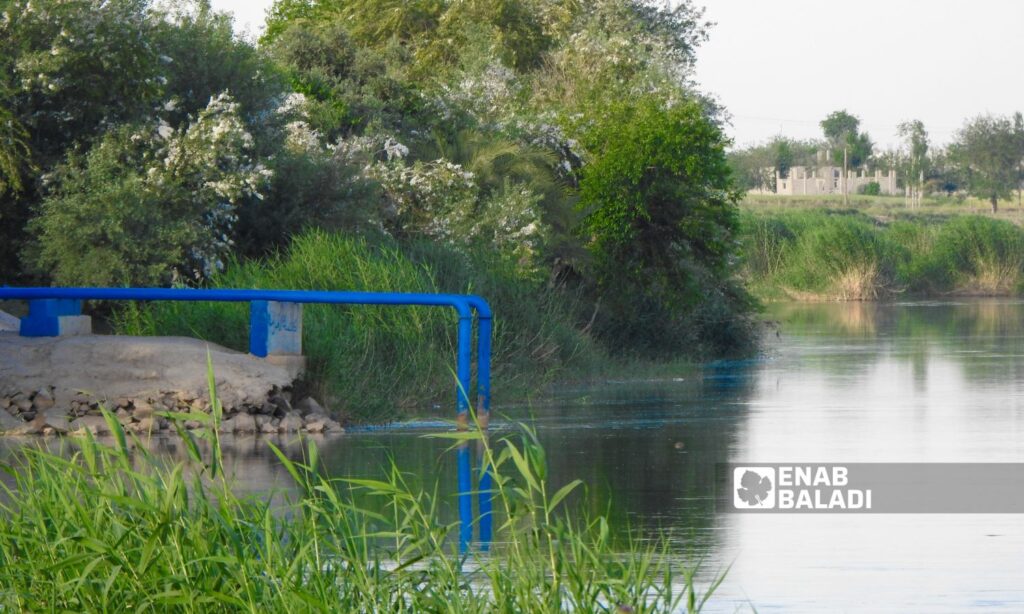Deir Ezzor – Obadah al-Sheikh
At their own expense, and instead of waiting for the institutions of the ruling authority or relief organizations, Deir Ezzor residents have implemented some necessary service projects amid the lack of basic services in the eastern governorate in various sectors, such as health, education, drinking water, electricity, and infrastructure.
The weakness of the public service reality in the area, which is under the control of the Autonomous Administration of North and East Syria (AANES), represents a major obstacle to emerging civil society organizations and the initiatives they put forward, as they face security and political pressures to meet the needs in the region.
Enab Baladi met with a number of farmers from the town of al-Kashkiyeh, east of Deir Ezzor, where they talked about projects implemented by the people in their area in the absence of support from the Civil Council.
Hussein al-Khalaf told Enab Baladi, “We worked with the region’s farmers to complete a project to deliver fresh water from the Euphrates River to the town’s lands at a distance of about four kilometers.”
Each kilometer cost about $1,000 to deliver water, according to al-Khalaf, who complained about the use of saline wells before the start of the project.
The farmer explained that the project has made wheat production better in the current season than in previous seasons. He also benefited from the delivery of potable water and alleviating the burden of buying water tankers at high prices of up to 40,000 SYP.
Al-Khalaf concluded his speech by saying that the AANES’ agricultural authorities “provide little aid,” which prompted the people of large lands who have the financial capacity to adopt this solution.
The Autonomous Administration is the only governing body responsible for providing services in the governorate, and it has a body called the Services Authority that is responsible for it and coordinates with civil organizations wishing to establish service projects.
Absent service projects exacerbate economic conditions
Some humanitarian organizations worked on road lighting projects, but they did not complete them completely, especially between the districts of Jadid Akidat and Dhibyan, due to the deteriorating security situation resulting from the activities of the Islamic State group, the large number of assassinations, and the proliferation of weapons among civilians.
Omar al-Yassin, a displaced person in the city of al-Basira, southeast of Deir Ezzor, told Enab Baladi that after the lighting poles were stolen in the city, the people of the area collected donations to re-install them after requests to the Services Directorate did not lead to any results.
Enab Baladi contacted the director of the Deir Ezzor Services Directorate to ask about the reasons for the failure without a response until the date of the report’s publication.
The scene is repeated in the town of al-Jarthi, located in the eastern countryside. Hudhaifa al-Kawan, a worker in the Awdah (Return) Organization for Development, says that the people of the town worked to light the area at their own expense, while the most important project of the organization in the region was a sports tournament to support sports and youth in the region.
There is an urgent need to clarify the roles of local councils and civil society organizations in creating job opportunities for the people of the region through educational courses or projects that offer job opportunities.
Humanitarian organizations based in Turkey are affected by the opposition political position of the authorities in the region, which would jeopardize their legal status there if they wanted to implement charitable projects.
Dozens of civil organizations are active in the governorate without official statistics. There are also some international organizations, including the Relief organization. On July 23, more than 100 civil organizations present in the region signed a joint statement related to the campaign for cancer patients in the Syrian north.
Civil Initiatives
The people of Deir Ezzor are famous for their relief campaigns for neighboring areas, which is evident in light of the dwindling support of civil organizations and the authorities in the region.
The most recent of these campaigns is the process of distributing drinking water in the neighborhoods of the city of al-Hasakah, northeastern Syria, through water tanks that arrived from Deir Ezzor as part of a campaign launched by tribes under the name “Al-Hasakah is dying of thirst.”
The distribution began in early August in several neighborhoods in the city, which have been suffering from a suffocating water crisis for about a month. The campaign included 100 tankers, each with a capacity of 100 barrels and 10,000 ice blocks collected from separate places in Deir Ezzor.
Last February, a relief aid convoy consisting of dozens of trucks entered from the regions of eastern Syria in Deir Ezzor and Raqqa to the areas that suffered damage to lives and property in northwestern Syria as a result of the Feb.6 earthquake.
Many local networks said at the time that the trucks numbered 80, collected by notables from the al-Uqaydat and al-Baggara tribes and other tribes in eastern Syria.
At that time, the fraternity campaign of Deir Ezzor tribes received wide interaction on social media and comparisons between it and the United Nations’ aid to the earthquake victims in northern Syria, which was delayed four days after the earthquake occurred under the pretext of logistical obstacles.











